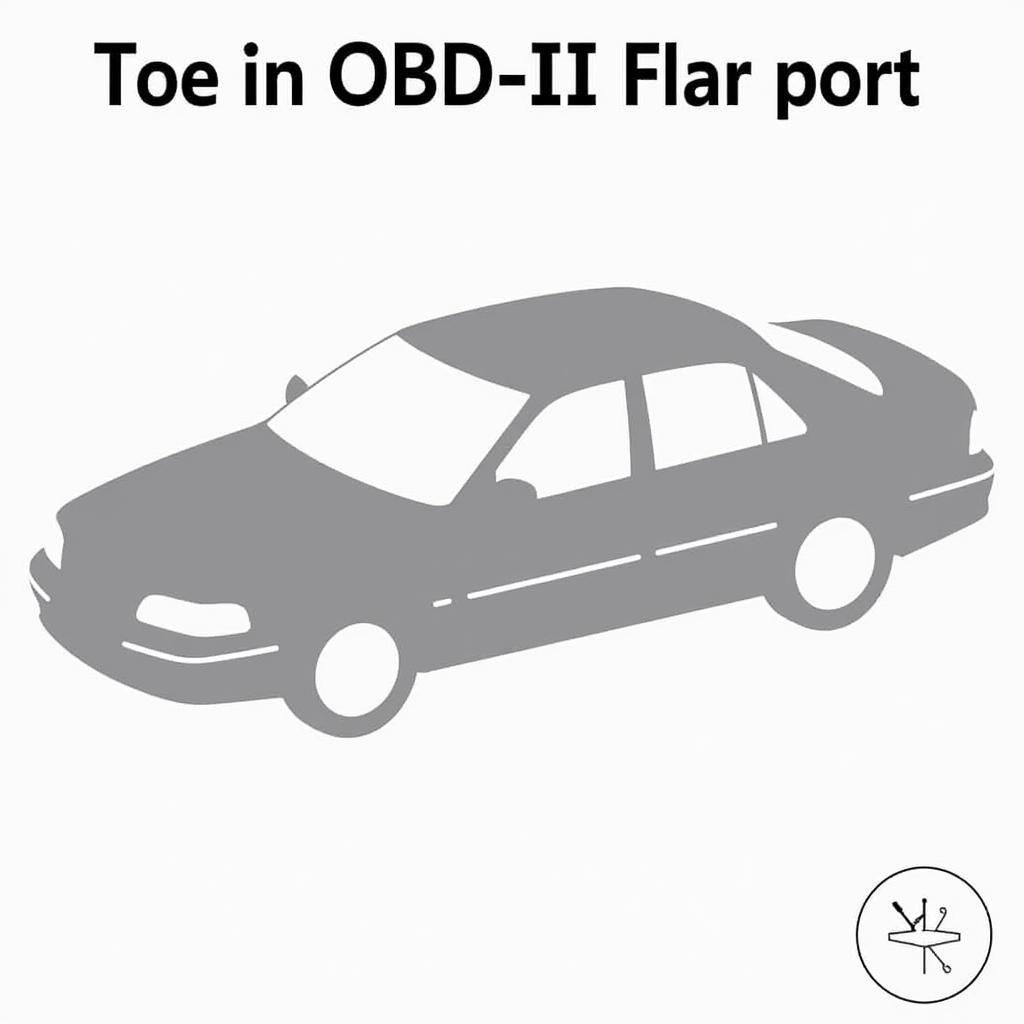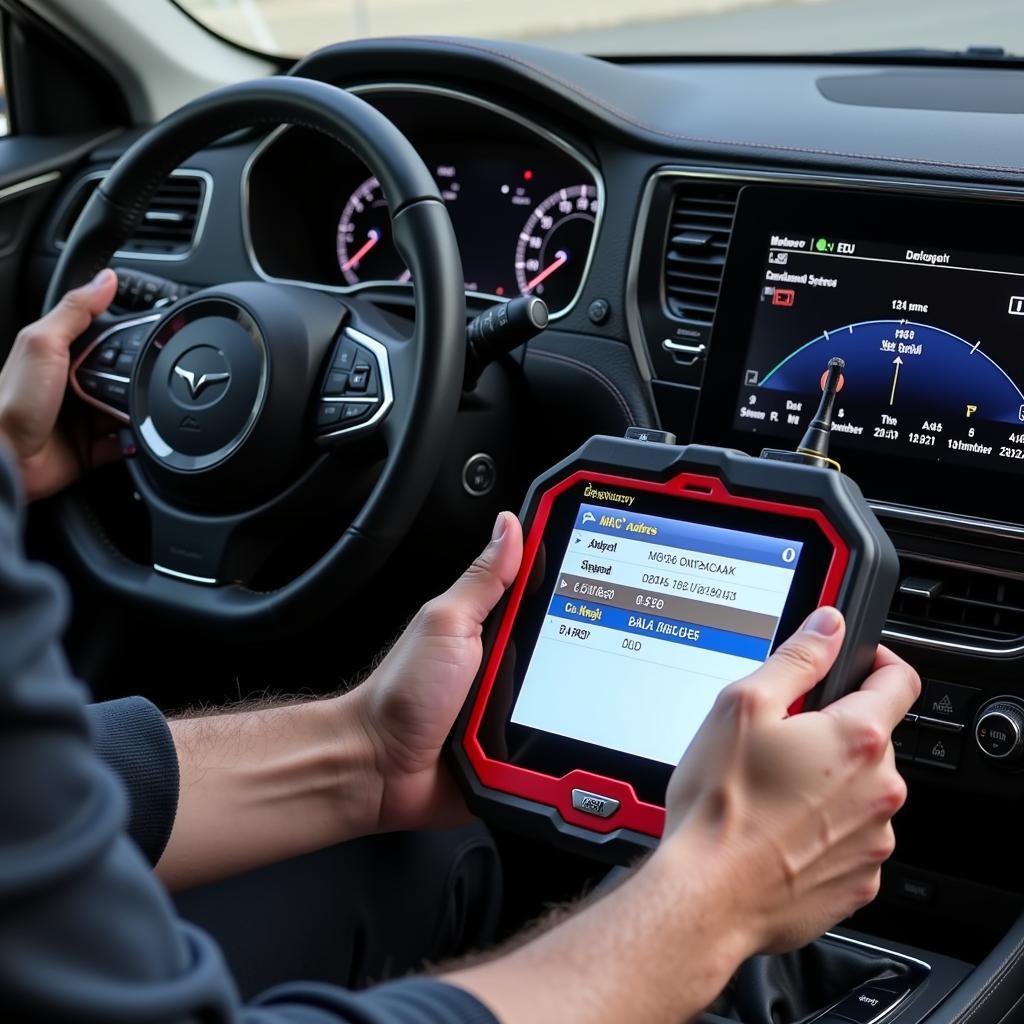Diagnostics Tools For Cars have become indispensable for both professional mechanics and DIY enthusiasts. With the increasing complexity of modern vehicles, these tools provide the necessary insights to quickly and accurately identify issues, saving time and money. Whether you’re a seasoned technician or a car owner looking to understand your vehicle better, this article will delve into the world of automotive diagnostic tools, exploring their types, functionalities, and benefits.
Similar to online smtp diagnostics tool mxtoolbox, identifying the root cause of car problems can be complex. Today’s vehicles are equipped with sophisticated electronic systems that control everything from engine performance to safety features. Diagnosing problems within these intricate networks requires specialized equipment. Gone are the days of relying solely on mechanical knowledge and intuition. Diagnostics tools for cars empower users to pinpoint the source of malfunctions, eliminating guesswork and unnecessary part replacements.
Understanding the Different Types of Diagnostics Tools for Cars
Diagnostics tools range from basic code readers to advanced scan tools capable of bi-directional communication with vehicle systems. Understanding the different types of tools available is crucial for choosing the right one for your needs.
OBD-II Scanners: The Foundation of Car Diagnostics
OBD-II, or On-Board Diagnostics, is a standardized system found in most vehicles manufactured after 1996. OBD-II scanners are essential diagnostics tools for cars, enabling users to retrieve diagnostic trouble codes (DTCs) stored in the vehicle’s computer. These codes provide clues about potential problems, ranging from simple sensor malfunctions to more complex issues with the engine or transmission.
Advanced Scan Tools: Unlocking Deeper Insights
Beyond basic code reading, advanced scan tools offer a wealth of features, including live data streaming, actuator tests, and special functions like key programming and module coding. These diagnostics tools for cars are invaluable for professional mechanics and serious DIYers, allowing them to delve deeper into the inner workings of vehicle systems.
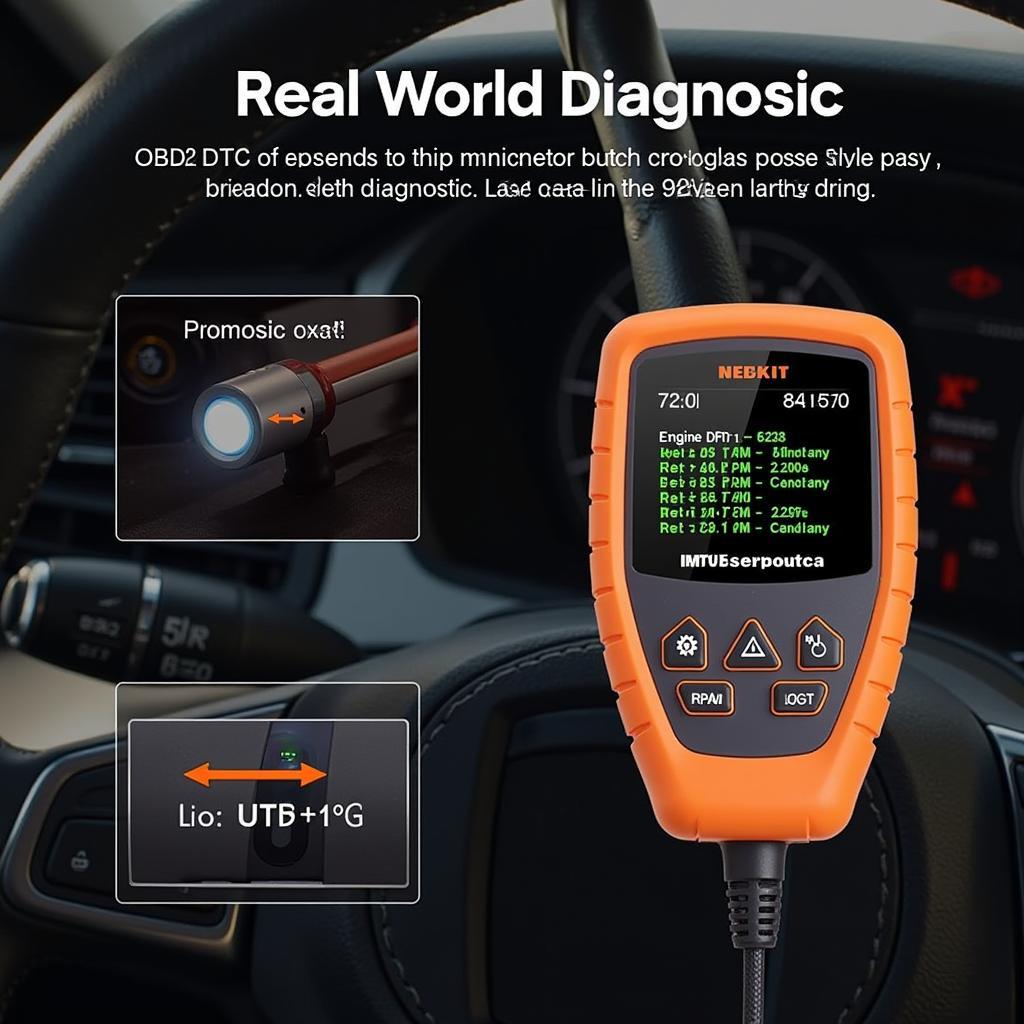 OBD2 Scanner Connected to a Car's Diagnostic Port
OBD2 Scanner Connected to a Car's Diagnostic Port
Oscilloscopes: Visualizing Electrical Signals
Oscilloscopes are sophisticated diagnostics tools for cars that allow technicians to visualize electrical signals within a vehicle’s circuitry. By analyzing these signals, they can identify intermittent faults and other issues that may not be detectable with traditional scan tools.
Multimeters: Measuring Electrical Properties
Multimeters are versatile tools used to measure voltage, current, and resistance within a vehicle’s electrical system. They are essential for diagnosing wiring problems, testing sensors, and verifying the proper operation of electrical components.
How Diagnostics Tools for Cars Benefit You
Using the correct diagnostics tools for cars can offer significant advantages:
- Accurate Diagnosis: Pinpoint the root cause of problems, eliminating guesswork.
- Time Savings: Quickly identify issues and avoid unnecessary repairs.
- Cost Savings: Reduce labor costs and prevent the replacement of unnecessary parts.
- Improved Vehicle Performance: Identify and address issues affecting fuel efficiency and drivability.
- Enhanced Safety: Diagnose problems with safety-critical systems like airbags and ABS.
“Diagnostics tools are absolutely essential in today’s automotive landscape,” says John Smith, a certified master technician with over 20 years of experience. “They’re like having x-ray vision for a car, allowing us to see what’s happening inside without taking everything apart.”
What Diagnostics Tool is Right for You?
Choosing the right diagnostics tools for cars depends on your specific needs and budget. For basic code reading and troubleshooting, an OBD-II scanner is a good starting point. For more in-depth diagnostics and advanced functionalities, an advanced scan tool is recommended. Professional technicians will likely need a combination of tools, including oscilloscopes and multimeters.
As with launch obd-ii book diagnostic tool, knowing how to properly use these tools is key. Understanding the data they provide and interpreting the results accurately is crucial for effective troubleshooting.
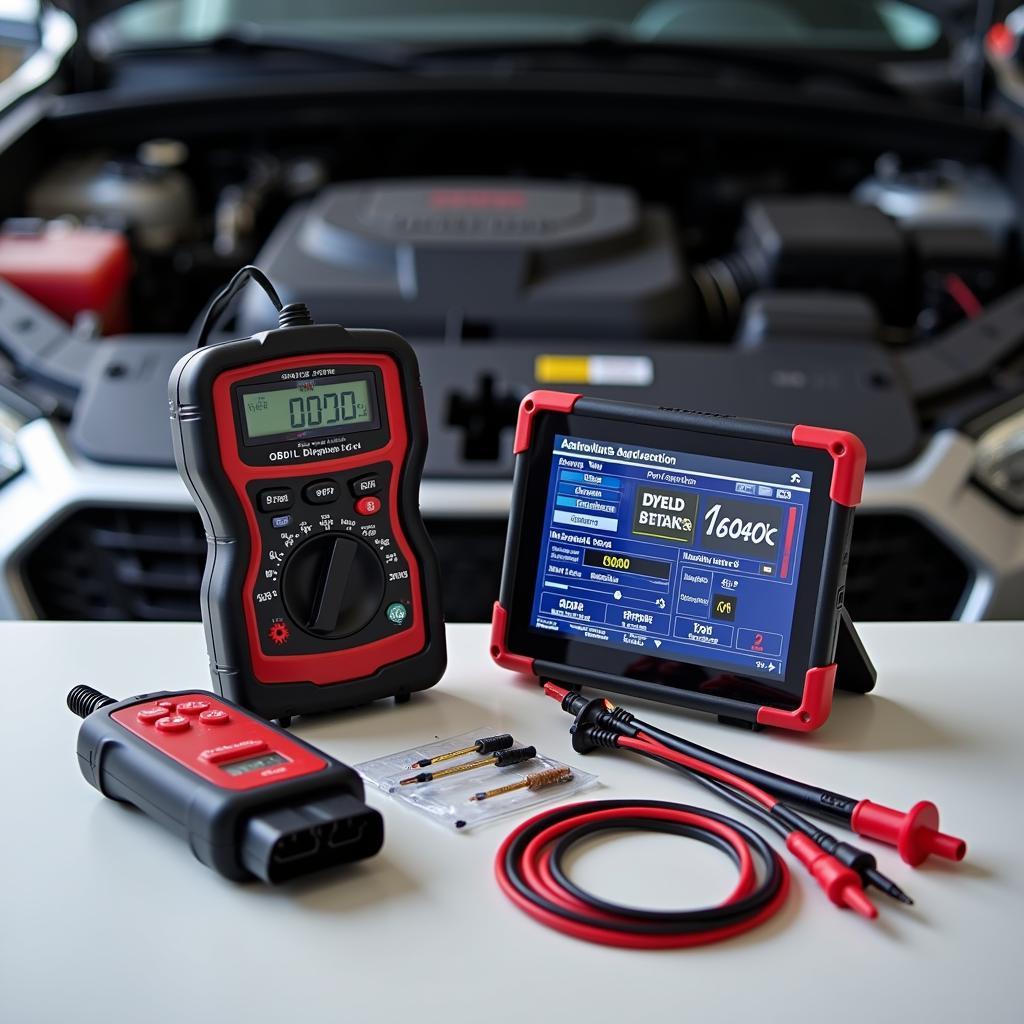 Assortment of Car Diagnostic Tools
Assortment of Car Diagnostic Tools
Diagnostics Tools for Cars: The Future of Auto Repair
Diagnostics tools are constantly evolving, incorporating new technologies and functionalities. As vehicles become even more complex, these tools will play an increasingly crucial role in maintaining and repairing them. “The future of auto repair is in the hands of those who embrace these powerful diagnostic tools,” adds Sarah Jones, an automotive electronics specialist. “These tools empower technicians to not only fix problems but to also understand and prevent them.”
Similar to microsoft diagnostic tool offline, some diagnostic tools can even function offline. This allows for greater flexibility and portability, especially in situations where internet access might be limited.
In conclusion, diagnostics tools for cars are no longer a luxury but a necessity in the modern automotive world. From basic code readers to advanced scan tools, these tools empower car owners and mechanics alike to diagnose problems accurately, save time and money, and keep vehicles running smoothly. Contact ScanToolUS at +1 (641) 206-8880 or visit our office at 1615 S Laramie Ave, Cicero, IL 60804, USA, for further assistance with your diagnostic tool needs. We’re here to help you navigate the complex world of car diagnostics.
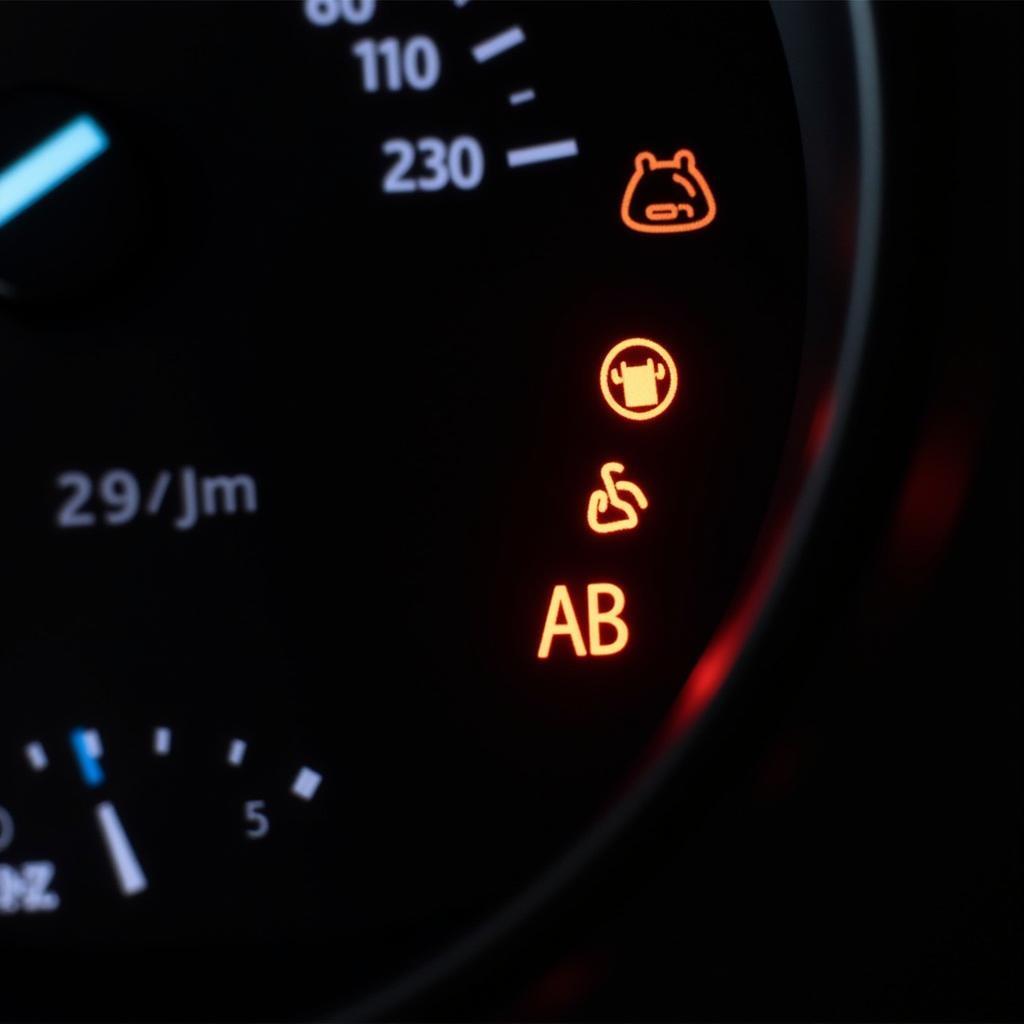 Modern Car Dashboard with Warning Lights Illuminated
Modern Car Dashboard with Warning Lights Illuminated
FAQ
-
What is an OBD-II port? The OBD-II port is a standardized 16-pin connector typically located under the dashboard on the driver’s side. It provides access to the vehicle’s diagnostic system.
-
Do all cars have an OBD-II port? Most cars manufactured after 1996 in the US and after 2001 in Europe are equipped with an OBD-II port.
-
Can I use a diagnostics tool for cars on my own? Yes, many basic OBD-II scanners are designed for DIY use.
-
What is a diagnostic trouble code (DTC)? A DTC is a code stored in the vehicle’s computer that indicates a potential problem.
-
Are diagnostics tools for cars expensive? Prices vary depending on the type and functionality of the tool, ranging from affordable code readers to more expensive professional-grade scan tools.
-
What should I do if my car’s check engine light comes on? Use an OBD-II scanner to retrieve the diagnostic trouble codes and determine the cause of the problem.
-
Where can I learn more about using diagnostics tools for cars? Numerous online resources, forums, and training courses are available to help you learn more about automotive diagnostics.
As with midea diagnostic tool, specialized tools are becoming more and more essential for diagnosing and repairing modern technology. Diagnostics tools for cars are no different and are essential for anyone working with modern vehicles. They provide the ability to delve into the electronic systems and gain a true understanding of the vehicle’s health.
Similar to saliva as a diagnostic tool article, diagnostics tools for cars provide a non-invasive way to assess a complex system. They allow you to gather valuable information without causing further damage or requiring extensive disassembly.

